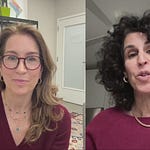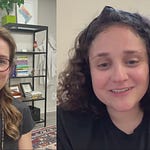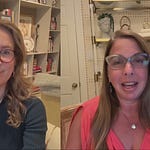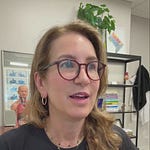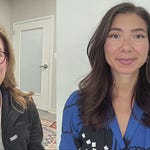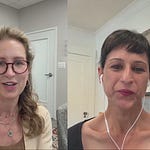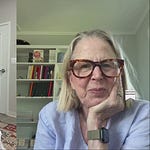You can also listen to this episode on Spotify!
What gives you meaning and purpose? How do you measure success? What does it mean to be healthy?
Suneel Gupta is helping people grapple with these essential questions.
His new book, Everyday Dharma: The Timeless Art of Finding Joy in What You Do, is about reconciling what we do with who we are. Gupta describes our “dharma” as our calling—or what Gupta’s grandfather called our “essence.” Gupta recognizes the central tension between outward markers of success and finding this internal sense of purpose. A successful entrepreneur and bestselling author, Gupta has also grappled with depression and self-doubt, fueled by the natural tendency to measure success with external metrics instead of asking ourselves the “Why?”
On this episode of Beyond the Prescription, Gupta explores the harms of hyper-vigilance and the power of vulnerability. They discuss the “Arrival Fallacy,” the false assumption that once you reach a goal, you will experience enduring happiness. He shares parts of his own process of self-discovery that allowed him to pursue his inner purpose and help others do the same.
Join Dr. McBride every other Monday for a new episode of Beyond the Prescription.
You can subscribe on Apple Podcasts, Spotify, or on her Substack at https://lucymcbride.substack.com/podcast. You can sign up for her free weekly newsletter at lucymcbride.substack.com/welcome.
Please be sure to like, rate, and review the show!
The transcript of the show is here!
[00:00:00] Dr. Lucy McBride: Hello, and welcome to my office. I'm Dr. Lucy McBride, and this is Beyond the Prescription, the show where I talk with my guests like I do my patients, pulling the curtain back on what it means to be healthy, redefining health as more than the absence of disease. As a primary care doctor, I've realized that patients are more than their cholesterol and their weight.
[00:00:31] We are the integrated sum of complex parts. Our stories live in our bodies. I'm here to help people tell their story and for you to imagine and potentially get healthier from the inside out. You can subscribe to my free weekly newsletter at lucymcbride.substack.com and to the show on Apple Podcasts, Spotify, or wherever you get your podcasts.
[00:00:57] So let's get into it and go Beyond The Prescription. My guest today is the ever dynamic. Suneel Gupta, who's passionate about helping people achieve success in a healthy, sustainable way. Suneel is a beloved speaker, a visiting scholar at Harvard Medical School, and best selling author of two books. His new book is just out. It's called, Everyday Dharma: The Timeless Art of Finding Joy in What You Do. It's really a practical guide to finding your dharma, your inner calling, and learning to integrate ambition, work, and well being to create a balanced life. The book combines Suneel's own stories with history science, Eastern philosophy, and Western methods. Suneel, thank you so much for joining me on the podcast today.
[00:01:49] Suneel Gupta: Oh, Lucy, I'm so glad we were introduced and it's good to be here.
[00:01:52] LM: So let's talk about Dharma. There's something about it that resonates with me as a physician who's in the constant quest tohelp patients pull the curtain back on their story. So what is Dharma?
[00:02:04] SG: Yeah, I mean, I wrote this book really for the same reason. I think that we are experiencing an overwhelming sense of emptiness right now and society sort of speeding up. All right, we're using artificial intelligence, we're using automation to continue getting faster and more productive. But I think as individuals, we're kind of in a lot of ways moving in the opposite direction.
[00:02:28] We are starting to feel like we are disassociating with our work, we are quietly quitting. And I think the result of all of it is that we are losing an emotional connection to what we do, which I think is a shame because we spend so much of our time either at a job or with the work that we do.
[00:02:45] And to not feel that connection is, I think, I think it's devastating, right? It causes, I think, a lot of the symptoms that you talk about on this show. And so the reason that I wrote this book is because I wanted to to talk about how do we bring that emotional connection back to our work in a way that really feels real to us? And dharma is an age old philosophy really about that connection and one of the underpinnings of dharma is that while it may be tempting sometimes to try to find happiness and bliss outside of your work, there also is another path which is finding it through your work, right?
[00:03:22] And Dharma is really the alignment of who you are and what you do, because when those two things are lined up, you feel creative, you feel energized. My grandfather called this your essence, right? And when you are expressing that essence, you're lit up, you're energized. But when you're not, you feel depleted, you feel burnt out.
[00:03:43] And so I think the question for us is, how do we now start to come back to this essence, right? And it's something that's available to I think all of us. It's not the kind of thing that you get to luxuriate about when you've hit a certain level of status or wealth. I think it's it's available to every single one of us no matter where we are in our career the the challenge though is that most of us don't know what our Dharma is and even if we do understand to a certain degree, what our Dharma is, what our inner calling is, we don't necessarily feel like we have the time or the space or the money sometimes, or even the courage to pursue it. And I wanted to write this book because I wanted to go directly into those struggles. Not to write a book about what purpose is sitting behind a desk, but how do you take this thing that you feel that you need to express, right, it needs to speak, and how do you once and for all start to bring that into your everyday life?
[00:04:39] LM: I love that I commonly talk with patients about this gap that exists in all of us between our best intentions and the execution of them. Meaning, like, we know we want to eat healthy. We want to exercise. We want to be more purposeful. We want to be more intentional. We want to put our phones down. We want to be happy and pursue things that are joyful, but there's that gap and the river is wide between the intentions and the execution. And you just said it, Suneel, sometimes the gap is filled with financial insecurity. Sometimes it's filled with logistical obstacles. Sometimes it's filled though, with fear and maybe even ambivalence, and then maybe even not knowing what your purpose is. So talk to me about how you might mind the gap. Those are my words, but how you kind of actualize and take control over your sort of sense of purpose and meaning.
[00:05:37] SG: Yeah. So two different things that come together, right? Who I am and what I do, right? And I think the what I do is the execution. Who I am is really sort of getting into like, what it is I care about. Let's start with who I am because I think that's just a natural place where I think a lot of us, I think me, me included would skip over. And the reason I would skip it over is because I would look to what everybody else sort of had, right? I would look to people I saw with nice cars and nice homes and really nice sounding LinkedIn profiles and bios. And I'd say, let me go follow that. And what I found over time is that I was really walking somebody else's path, not my own.
[00:06:12] And I think the work to sort of coming back to yourself and understanding what you want, it doesn't have to be something that you go on a huge meditation retreat. to do, right? I think it comes through starting to ask yourself certain questions. And in the book, I go through a list of sort of questions that really sort of helped me kind of get to this point.
[00:06:31] I call these the chisels. And the reason I call these the chisels is because Michelangelo, when he would look at a block of marble, he would say the sculpture is already inside. All I have to do is chisel away the layers. I don't have to create something from the ground up. And I think dharma, or calling, is very much the same thing.
[00:06:48] I bet that at some point in time, you have experienced your dharma. Like, you have lived up in a certain way. It may have been when you were a child. It may have been last week. It may be something that you're actively doing even at your job right now, but you're just not, you're not in tune with that.
[00:07:03] You're not in touch with that. So what I think of one of the very first things that we can start to do is start to identify the bright spots, whether that be in a past role or in a current role, these moments that really made us come alive. I think the key here that I think that we sometimes miss, I know I did, was that when we think about things like purpose and dharma, we think about a job.
[00:07:23] And so like in the book, for example, I tell the story of a woman named Mila, who really wanted to be a teacher. She was a project manager, but she really wanted to be a teacher, right? And she was frustrated because she couldn't, like, realistically, she had kids, her family relied on her health benefits, like the idea of leaving her job, going back and getting a teaching certificate was just not something that fit her practical life.
[00:07:46] And she was frustrated by that. And I think a lot of people sort of find themselves in a similar position. But when she was able to peel back the layers and understand, well, what is it about teaching that I love, right? When I dig below the occupation and into the essence of teaching, what ultimately arrived for her was that she loved to help people grow.
[00:08:05] And there was this emotional conversation she had with her mom, where her mom's like, Yeah, you've always loved helping people grow. Ever since you were a little kid, you were the kid who helped the kids on the other, on the block, like, learn how to ride bikes. It's the thing that's always been a part of you.
[00:08:19] And once she sort of reconnected with that essence, all of a sudden, all these different ways of expressing that began to open up for her, right? Teaching was obviously one of them, but she could start to coach people at work. She could step into a lateral shift into HR and start growing people inside the company.
[00:08:35] And all these options started to pop up for her. When that happens, Lucy, it's liberating because how many of us right now are like, Oh my God, like if I just took that other fork in the road in my career, then I would have ended in this job that would have been perfect for me right now. And I would be so much happier.
[00:08:52] Well, the reality is that over 90% of us right now are looking for jobs, right? In 2023. Over 90% of us right now are looking for our next job, and what the data almost overwhelmingly shows is that we're going to jump to the next job, and within a few months, we're going to feel exactly the way we feel right now, right?
[00:09:09] So I think with Dharma, with who I am, we're peeling underneath the occupation layer, and we're going into the essence layer. When you tap into that essence, you can start to figure out how to express that, and your world kind of opens up.
[00:09:21] LM: It's amazing the way you describe it. I love the Michelangelo image, right? The block. And he says, I'm just repeating it back to you, but he says the sculpture is already there. It's just that you have to pull back the layers and that's exactly right. I think when people are able to do that, as you've described in your book.
[00:09:40] LM: To me, that's the definition of health. I mean, health also includes having nice cholesterol levels, not having a heart attack, doing your cancer screenings, but health at its core is about awareness of our stories and how they live in our bodies, awareness of medical data, our own data, and the way our data is contextualized in the literature and then accepting the things we can't control, so other people, our genetic predisposition to breast cancer, and then finding agency where we can, because we can't control other people. We can't control certain genetic predispositions. We can't control the fact that we may be financially bound to stick with a job we're not fully actualized in, but people often have more control than they think.
[00:10:28] And I think what you're saying, Suneel, is that part of the control and the agency we have, which is ultimately. To me, a part of definition of health is simply querying our own bodies and minds and asking ourselves, like, what is my passion? What am I here for? How do I feel when I'm doing something that gives me joy? And can I recreate that in other spheres of my life, whether it's at work or parenting and ultimately that feeds back onto our health. I mean…
[00:10:55] SG: It does.
[00:10:56] LM: During the pandemic, for example, I saw people every day who were experiencing physical manifestations of emotional distress. And some of it was burnout from caring, caregiving and parenting and living through a pandemic, just being a human.
[00:11:08] But even now, I mean, people are wired and tired and they don't feel well. And so it's reassuring to me to hear someone like you talk about, to me, what is really the essence of health in your book.
[00:11:24] SG: Dr. Tal Ben-Shahar, who you may have crossed paths with at Harvard, really sort of, I think, Explains this nicely, which is like he has this phrase called the arrival fallacy and the arrival fallacy is basically this idea that like we're going to hit this moment where we've attained enough wealth, enough status in order to feel this lasting sense of joy on the inside.
[00:11:47] And until then, we're willing to suffer. Until then, we're willing to sort of grit it out, grind it out, do whatever we need to do because we believe we're going to hit this moment where it's all going to have been worth it. And at some point in time, I think we all get wiser to this idea right? And I would argue that We're starting to realize that earlier in our lives.
[00:12:05] I think Gen Z is asking difficult questions that older generations sometimes don't like because they're like we didn't ask those questions when we were your age, right? And they're, I think, very understandably saying, yeah, but you don't seem very happy. And we want to do things a little differently than you.
[00:12:20] I mean, the country has gotten richer, we've become more productive, but we're also more lonely than ever before. Mental health issues have never been higher, right? We feel disconnected from one another. That's not necessarily sort of the train that I want to get on. And so to ask the difficult questions right now, and to your point, to be inside out about it, right, to peel back the layers, I think it's a very reasonable thing. And then the question I think becomes, well, then once I start to peel back those layers, how do I actually put it into practice, right? Because there's nothing more frustrating than understanding who you are, but showing up every day and feeling like you're walking in somebody else's path.
[00:12:55] And what I try to do in the book is really get into those struggles again, like we may not feel like we have enough time. We may not feel like we have enough money. We may feel like we know exactly what it is, but we're scared of that. And so I wanted to tell like the everyday stories of people who were able to not necessarily even leave their jobs.
[00:13:14] Like one of my favorite stories in the book is, is about a nurse who really wanted to be a writer. And her parents said, no, you can't be a writer. You're first of all, writing is not a profession. It's going to make money. You're not a, you're not a man, right? Like, and, and like, if you're a son, if you're a son, maybe, but like, as the daughter, no, you're not going to be a writer.
[00:13:31] And so she got pushed into a different field and became an outstanding nurse. But one of the things that she realized is that she was able to bring her persona as a writer into her work of nursing. And one of the ways that she did that, it was through her patient paperwork. So, while most people like, try to get through, and you know this Lucy, try to get through the paperwork as quickly as possible, like put the clinical details in, she started to actually expand on those clinical details into like, who were these people?
[00:13:56] What did they care about? Who do they love? What was their life like at home? What was their experience of being a human like? And she would start to pour her heart as a writer into these clinical patient forms to the point that like literally this paperwork was getting passed around the hospital like novels people loved reading it because it gave them a sense of purpose and what they were doing and so she was able to express this dharma as a writer through her occupation as a nurse and the point of it all is that oftentimes we think that in order to live our purpose we have to blow up our lives. We have to leave our jobs, right?
[00:14:30] We have to move to a different place and become a painter or leave everything we have behind. Not true. And there's so many situations and stories in the book. We talk about sort of how Dharma doesn't have to be a separate path, but it can be a permutation of what you have right now. You don't have to leave everything behind. You can start to bring a new persona into where you are today.
[00:14:49] LM: I love that Suneel, I think you're right that life happens in the mundane in a way, right? It's not in the big sort of huge moments. It's really in the everyday moments that sometimes we don't even know exist. It's just a tuning to the present. How did you get to be so wise? I mean, you're young and you talk a lot about burnout and failure.
[00:15:12] I love that story you told about. You told your wife, I'm a failure and she's like, no, you're not a failure. And you're like, well, the New York Times says I'm a failure. And then you showed her the article about your talk about failure. And so like, what is your story? How did you get to the place where you are now writing and speaking and talking about these very soulful topics?
[00:15:36] SG: Yeah, I mean, I think success is a lousy teacher, there's no doubt about that. It's wonderful, I'm not trying to downplay success, like, I think that I've had some success in my life and has been able to provide the sort of, I think, a life for my family, it's allowed me to sort of take care of my kids, and I'm very thankful for that.
[00:15:54] And yet, if I look back at sort of where the learning really came, where the growth really came, it didn't come from success, it came from setbacks, it came from mistakes. It came from change when I coach sort of organizations and leaders today, and I asked them, what was the most important part of your career, right? Most important year of your career. Very rarely do they say like it was the winning year when I had the most profit or it was when I earned the biggest salary. Most of the time it's like something big happened, it was a big change and usually that change isn't positive. It's like it was something that got knocked back on their ass and they had to sort of learn and that changed everything for them.
[00:16:32] But that was really meaningful. And I think I've had no shortage of I think those moments where I felt like I wanted something really badly and I put myself out there and it didn't happen. I think the learning for me, though, sort of came from sitting down and writing about that. Right? So, I think, if I'm being honest, like, I started writing because I was depressed.
[00:16:55] I was feeling anxious. And I realized that I was dumping a lot of that on my wife. I was spending a lot of time talking to her about that, and I realized, and as, like, loving as, like, Lena is, I realized it was unfair for her. She was always listening, but it was unfair to just, like, almost, like, vomit my trauma on her.
[00:17:13] And so I started to use the page, right? Literally sit down at my desk every morning and I started to write about these things that I felt like I was struggling with and searching for answers to that would do it every morning because the page always listened, no matter what it just listened. And I'd say 99% of what I've written in my life has ended up in like a trash bin, nut there were some pearls there were some little pearls that was able to string together along the way and eventually those pearls started becoming blog posts that became published articles. Eventually they became books and that's just kind of the thing like I think if you look hard enough There are these poor these pearls of wisdom.
[00:17:55] I talk about this a lot in the book is like I think I was following sort of an outlook of resilience before right and now I feel like I'm following an outlook of growth and the difference between the two is that like with resilience, there can be a tendency sometimes to just like want to get back up right like pull yourself up by the bootstrap, let's get back up. But I think growth is getting back up, but also taking some time to understand. What did I learn. If my kid was in a similar situation? Well, how would I sort of help coach them through a situation like this? What would they learn from my mistakes? Taking such a taken like a reflective view on that.
[00:18:35] Even just spending some time moments, right, to write about it, to learn about it, even if it's just for your benefit. Nothing you're gonna publish, but just something that you're gonna reflect on yourself I think can be the difference between cycling through the same mistake over and over again, and I think actually using a setback to create genuine.
[00:18:56] LM: I love that. I have a comment and then a question. The comment is about the writing. Like you, I find writing to be very therapeutic. I find that I can really crystallize a lot of my thoughts. I mean, writing ultimately is about thinking. And when you're putting things on the page, it's clarifying to oneself about how you're thinking.
[00:19:17] It also can disarm some sort of scary thoughts. I have found, like, when I've had depression symptoms or I've been anxious, when I journaled, I was a journaler from a young age. Just intuitively, I knew to write. When you look at the words, A day or two later, you realize that with time and with perspective, they're not so terrifying.
[00:19:37] And so, I too find writing really therapeutic and I recommend it commonly to patients who are experiencing depression or anxiety or trauma as an adjunct to other sort of treatment modalities, but certainly kind of writing down our thoughts can help disarm them.
[00:19:52] SG: Yeah. One of my favorite techniques is to write what I call sort of the if true, then pattern.
[00:19:58] LM: Tell me about that.
[00:19:59] SG: going a little bit deeper into the fear can be a really illuminating thing. So if I'm scared that I'm going to blow a presentation, right, I'll write that down. Like that's the thought inside my head, you're going to blow this presentation.
[00:20:12] And then I kind of talk with the fear. I say, okay, let's pretend that happens. If true, then what? And then it's, you're not going to get the deal or you're not going to get the, you're not going to get the job or whatever it is. Right. And they say, if that's true, then what? Well, then you're, you're not going to have this role that you wanted.
[00:20:27] If that's true, then what? Well, then you're going to blow up your career. And if that's true, then what? And I continue to just sort of go deeper down. And when it starts to make me realize is that underneath this surface level fear, all these sort of deep seated concerns that almost in all probability will not come to happen, but the other thing is that at the very bottom of that list Right when I really dig down to the root of it It always ends with something like well your wife is no longer going to love you, your kids are no longer gonna love you, right?
[00:20:59] And I think to myself Wow, that's the deepest root of my fear and I actually have more control over that right now Then I do whether I get this presentation done like I can go give my kids a hug I can go tell my wife I love her. I can do that right now. What happens inside that presentation, I don't know. But I know the deepest fear, I can deal with right now.
[00:21:21] LM: It's such a powerful point, Suneel, because I think all of us have at our core, the fear of not being loved or being worthy. Like shame and feeling excluded or not loved are like the deepest fears. And I think a lot of those fears come up in our childhood naturally, right? Like I think of life as this set of experiences and we're like a blank canvas when we're born and then you experience loss and challenge and hardship and dings on your self esteem.
[00:21:57] And then we create this sort of network of connections in our minds. In fact, we call it the default mode network. It's a set of neural pathways in the front of our brains that basically are derived from a lot of pattern recognition so that we don't reinvent the wheel every time we come across a new scenario, right? Like, we lose that wonder and curiosity of childhood.
[00:22:20] But we also gain some street smarts, but the downside of that default mode network in the front of our brains is that we can start to make assumptions about things and make connections and thought and behavioral patterns that actually aren't serving us at the time. In other words, you can have an experience as a child where you were terrified and felt vulnerable.
[00:22:41] Maybe you weren't picked for the team or something. And then you wrote a story in your mind about why. And then the next time something happens to you that's like that, even in your adulthood, you might then go back to that sort of I'm not worthy narrative. So, this is a long way of asking you, about your childhood.
[00:22:59] And now we're going to do like go deep here. Like, I love that pinned tweet on your Twitter feed. I guess it's called X now, about your mom. And I'm like, okay, there's a story there. First of all, her story and then your story of her being your mother. Someone says to her, “go back to your country.” And she says, this is my country.
[00:23:17] And then I think the man says, get out of my kitchen. She says, this is my kitchen. And then there she is in all of her glory on time magazine, telling her story. Tell me about like growing up in your family. What was her story? How did that affect your story? And then your telling of it to yourself and then the experience of fear and vulnerability, like you just described,
[00:23:37] SG: So, mom grew up on the border of India and Pakistan, right? When it was all one big country, when it was India. When the country split, during partition, was one of the bloodiest conflicts that humanity has ever known and she was part of that. She was in, she was right in the mix of it and their family fled.
[00:23:56] She ended up in a refugee camp as a kid, very little running water, no electricity, but she decided that she was going to teach herself how to read. And she felt like that was going to be sort of her path out of poverty. And so she did. And she knew she had enough foresight even back then to know that like English was sort of the language that she would have to learn if she wanted to get herself to the United States because that was her dream. And so she started reading and the first book that she read from cover to cover was a story about Ford Motor Company because Ford Motor Company was literally the Google of its day.
[00:24:30] The big, it was the big company. Everybody knew about it, right? If you were rich and you were driving sort of a Ford car, even around sort of certain parts of India and she would see that and that's what she wanted. And she wanted to be an engineer, as well, and she set her heart on that, and it was a very unlikely dream because people from her country, especially women, that period of time were destined for the kitchen, right?
[00:24:53] And I mean, the best case scenario for her as told to her by some of the other people in her village was Find a rich man, find a wealthier man, somebody who isn't in poverty, and that's your path out. She wanted more, like she wanted to express herself. And so she studied hard and people got behind her, her parents got behind her, they saved every rupee that they had.
[00:25:13] She was able to get on a boat to eventually the United States. She got a scholarship to Oklahoma State University. The day after she graduates, she finds herself to Detroit, Michigan. She applies for her dream job. There's a lot there. There's another story there. But she gets it. And in 1967, the reason Time Magazine wrote about her is because she became Ford Motor Company's first female engineer.
[00:25:34] Ford Motor Company had thousands of engineers on staff at that point in time. Not a single one of them was a woman. And so here she is, this woman who tends to dress in saris, and she cooks and eats mainly Indian food back at home, and she is now amongst this, like, sea of mainly white men who are doing this job, and she finds a way to sort of fit in, or I shouldn't even say finds a way to fit in, she finds a way to be herself in a very different environment.
[00:25:58] And, and I think that for me as a kid growing up in almost the opposite situation. I'm an Indian kid now growing up in America. I live in suburban Michigan. Everything is compared to my mom. We lived in a pretty, we lived in a three bedroom house, but like it was a night and day difference from the conditions that she grew up in.
[00:26:17] It was the equivalent of a silver spoon in my mouth and the fact that I could eat every single night. I think that for me, what. I've learned about my mom and what I've learned about, I think other leaders who I spend time studying and I think admiring who have done difficult things is I think that the thing that holds a lot of us back are the words, “I'm not ready.”
[00:26:40] Right? Like, I'm not ready to, to run with that thing. I'm not ready to step into that role. I'm not ready to speak my mind. I'm not ready. And I think the confusion sometimes is in believing that the people who did difficult things, my mom included, is that they were somehow ready to do what they did, but they weren't, right?
[00:27:01] I call this the game of now, in my book, versus the game of someday, right? The game of someday is you wait for courage. You summon up enough courage, and once you actually have enough courage, you take action. And I think that's the way that most of us behave. There is another game, and that's the game of now, which is that instead of waiting for courage in order to take action, you just take action, and you let courage catch up along the way.
[00:27:27] And I think the thing that I've learned is that it almost always does. If you just say like I'm gonna go do that thing courage will come even begrudgingly courage will be like, okay. I'm with you, right? That's the thing I learned about her story is that it wasn't the story of a little girl in a refugee camp who said f*ck it all I'm gonna go do this thing. It was more a story of a scared person who said I want this really badly and I'm scared And I'm going to do it anyway.
[00:27:58] LM: that is a huge lesson. And I wonder how she expressed that. I mean, you told me in so many words, but like. Did she talk about like the lack of courage? Did she talk about her fear and just doing it despite having the courage or did she just model it? Was it the kind of thing you talked about as a kid?
[00:28:17] SG: Not as a kid, no. I think as a kid, I had very surface level conversations with my mom. I marveled at her story, I marveled at who she was, but I didn't really dig into the how. If there's anything that I felt as a kid, I felt like kind of almost insecure because here was a parent and I have a brother who's done amazing things as well and my father's an immigrant too.
[00:28:40] And so I sort of, I felt like I kind of came from this really brave family and I felt insecure because I actually didn't feel all that brave. I just didn't. And, and that made me feel bad because it was just, I felt like, wow, like, gosh, I'm surrounded by all these incredibly courageous people and I'm not one of them.
[00:28:58] But. I began to realize over time, more from the stories that I would dig into, more from hearing about what it was like at Oklahoma State University when she was sitting in her dorm alone, right? What was that sort of like for her because she didn't eat meat and she couldn't go to the cafeteria because she was a vegetarian?
[00:29:17] What was that like for her? And I think when you dig into people's stories and you get beyond this happened and this happened and you just simply start to ask the question of like, what was that like for you? And that's when you start to get insights, but I didn't start asking those questions until I was a teenager or maybe even in college when I would come home and have conversations with her.
[00:29:35] And the thing about it, Lucy is like, I love that question now. Like I host a documentary series where I travel around the world and I meet with all these leaders who've done crazy things. And I almost always dig into less of what they did, but what were they feeling in those moments along the way?
[00:29:54] LM: It's the essence of who people are. Right? Suneel, I can't thank you enough for joining me on the podcast. You are such a bright light and I can't wait to share your book more widely and to reread it. And I just thank you so much for your pearls of wisdom and for acknowledging that you're a work in progress too.
[00:30:13] I think that we're never done. We're never done in the process of self discovery and then bringing our best selves to our relationships, to our work. And so I appreciate the humility that you offer as well. So thank you.
[00:30:26] SG: Thanks, Lucy. It's so good to be here.
[00:30:35] LM: Thank you all for listening to Beyond the Prescription. Please don't forget to subscribe, like, download, and share the show on Apple Podcasts, Spotify, or wherever you catch your podcasts. I'd be thrilled if you liked this episode to rate and review it, and if you have a comment or question, please drop us a line at info@lucymcbride.com. The views expressed on this show are entirely my own and do not constitute medical advice for individuals. That should be obtained from your personal physician.







